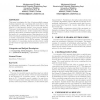10 search results - page 1 / 2 » Factors governing the behavior of multiple cooperating swarm... |
GECCO
2005
Springer
13 years 10 months ago
2005
Springer
This paper investigates the idea of having multiple swarms working separately and cooperating with each other to solve an optimization problem. Many factors that influence the be...
HICSS
2005
IEEE
13 years 10 months ago
2005
IEEE
In recent years, the development of software in open source communities has attracted immense attention from research and practice. The idea of commercial quality, free software, ...
CHI
2010
ACM
13 years 8 months ago
2010
ACM
The use of ICTs in the public sector has long been touted for its potential to transform the institutions that govern and provide social services. The focus, however, has largely ...
ISMIR
2004
Springer
13 years 10 months ago
2004
Springer
A set of principles (based on Gestalt theory) governing how we group notes into meaningful groups has been widely accepted in the literature. Based on these principles, many diver...
TFS
2008
13 years 4 months ago
2008
Abstract--This study proposes an efficient self-evolving evolutionary learning algorithm (SEELA) for neurofuzzy inference systems (NFISs). The major feature of the proposed SEELA i...

